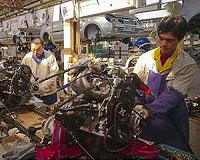| . |  |
. |
Brussels (AFP) Oct 5, 2010 Europe pressured China Tuesday to let the yuan rise as fears grew of a global "currency war" while a French call for a new, more stable world monetary order received short shrift from Germany. A trio of top eurozone officials urged Chinese Premier Wen Jiabao to live up to a June vow to make the yuan more flexible to counter accusations Beijing deliberately undervalues its currency so as to boost exports and growth. Leading euro finance minister Jean-Claude Juncker, European Central Bank head Jean-Claude Trichet and European Union economic affairs chief Olli Rehn each told Wen the yuan should be allowed to find its natural level. "Orderly, significant and broad-based appreciation of the renminbi (yuan) would promote more balanced growth," Juncker said after talks with Wen on the margins of a Europe-Asia summit, stressing the yuan remains "undervalued." The euro was at fresh eight-month highs on Tuesday at 1.3851 dollars, highlighting the problems for the eurozone as its currency soars against a weakening dollar and the yuan, also called the renminbi, undercutting its export competitiveness. The hot topic was not on the official agenda as the 46 European and Asian nations met but it has overshadowed the gathering so far and will figure prominently at direct talks between Brussels and Beijing on Wednesday. The issue -- amid fears that countries are each trying to undercut competitors by weakening their currencies -- is also likely to loom large at the annual International Monetary Fund meeting beginning Friday. French President Nicolas Sarkozy, who takes the chair of the Group of 20 leading global economies next month, wants to to see a new world monetary order so as to head off what could turn into a dangerous, beggar-thy-neighbour race to the bottom, similar to what happened in the 1930s Great Depression. "We don't have a single place, worldwide, where we can (resolve) monetary issues," Sarkozy said. "Everyone does as they want, everyone, each to their own, tries to preserve their own sovereignty but we are living in the 21st century without a monetary order," he told fellow leaders at the Asia-Europe meeting. The idea, however, was instantly shot down by German Deputy Foreign Minister Werner Hoyer, who deemed it "particularly vague." The United States and the European Union have become become increasingly frustrated by the massive trade surpluses that China and to a lesser extent other emerging countries build up on the back of cheap exports. China pegged the yuan at about 6.8 to the dollar for the past two years but said in June that it would allow the unit to rise, partly to calm growing criticism of Beijing. Since then, however, the yuan's gains have been minimal and Wen warned recently that allowing the currency to strengthen too much could wreck Chinese exports and possibly spark massive social unrest as the economy slumped. On Monday, he called for stability in the exchange rates of major currencies, saying: "We must work together to promote world economic growth. "We should intensify macro-economic policy coordination, manage with caution the timing and pace of an exit strategy from economic stimulus and keep the exchange rates of major reserve currencies relatively stable." Some analysts believe the yuan should be valued as much as 40 percent higher and Brazil's Finance Minister Guido Mantega has warned that the world is already locked in "an international currency war." IMF managing director Dominique Strauss-Kahn said on Saturday that if policymakers did not return to the sort of international cooperation seen in the financial crisis, there would be a new crisis "of countries trying to find domestic solutions to a global problem." Wen meanwhile wants Europe to give far more say to developing countries in how the world is ordered, not only in the IMF but also in the other agencies such as the World Bank. "We need to improve the decision-making process and mechanisms of the international financial institutions," Wen said, highlighting a need to "increase the representation and voice of developing countries." European governments agreed last week to hold talks with the United States and other partners on allowing the developing economies a greater say but hedged their offer with significant conditions.
Share This Article With Planet Earth
Related Links Global Trade News
 China manufacturing picks up in September: survey
China manufacturing picks up in September: surveyBeijing (AFP) Oct 1, 2010 Manufacturing activity in China picked up pace in September, a government survey showed Friday, providing a counterweight to concerns that the world's second-biggest economy is slowing down. The purchasing managers index rose to 53.8 in September from 51.7 in August, the China Federation of Logistics and Purchasing (CFLP) said in a statement. The results come after an independent survey ... read more |
|
| The content herein, unless otherwise known to be public domain, are Copyright 1995-2010 - SpaceDaily. AFP and UPI Wire Stories are copyright Agence France-Presse and United Press International. ESA Portal Reports are copyright European Space Agency. All NASA sourced material is public domain. Additional copyrights may apply in whole or part to other bona fide parties. Advertising does not imply endorsement,agreement or approval of any opinions, statements or information provided by SpaceDaily on any Web page published or hosted by SpaceDaily. Privacy Statement |